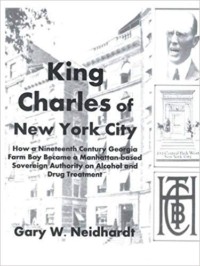Title: King Charles of New York City, The Life of Charles Barnes Towns
Author: Gary W. Neidhardt
Publisher: Westwood Books Publishing, LLC
ISBN: 978-1-64361-261-4
Pages: 336
Genre: Non-fiction, History, Biography
Reviewed By: Susan Brown
Pacific Book Review
Writing a book that shines a light on a specific time in history can provide a mechanism to take a look at the past, with a nod to understanding the present. Author Gary W. Neidhardt has done just that with this book on Charles Barnes Towns who, according to Neidhardt, is “one of the most compelling and enigmatic figures in the history of drug policy and the history of addiction treatment in the United States.”
Today, if Towns’ name rings a bell with anyone, it is, most likely, with those who have participated in the Alcoholics Anonymous (AA) program. AA founder, Bill Wilson, had a life-changing experience at Towns’ clinic which put into motion Wilson’s formation of AA, certainly one of the most distinguished recovery programs in place today.
Towns’ work treating alcoholics in the early part of the 20th century with “what was believed to be the only proven solution for addiction and alcoholics in the world, gathered national attention as if he were P.T. Barnum.” This veneration was surprising given Towns’ humble beginnings. Born on a farm in Georgia in 1862 to the son of a Confederate Lieutenant, he didn’t get much of an education, going only as far as middle school. But with a fierce determination and an insatiable curiosity, he managed to become the “King” of addiction treatments, at a time when temperance movements were in full swing, extolling the negative effects of alcohol on body, mind and spirit and pushing for prohibition.
Towns however, was creating a program for life-long recovery. He did it with a silver-tongued persuasiveness that had been honed as an insurance salesman. With no medical background he managed to convince the medical community that he had the cure, albeit a secret one, to addiction. He opened a clinic in a tony section of New York City, placed ads in periodicals extolling his enormous success rates curing addicts, hired respectable physicians to assist in the clinic, wrote numerous articles, as well as a book, Habits that Handicap, plus pushed for legislation that resulted in the implementation of the Harrison Act in 1915.
Much of Neidhardt’s book is a compilation of extractions from the prolific writings penned by Towns, woven together to provide a picture of this self-promoter who also, had a deep sympathy for and understanding of an addict’s struggle. This led Towns to do and say outlandish things in his efforts to promote his cure, but it also moved the conversation of addiction to alcohol, drugs and even tobacco onto the national stage. Neidhardt is meticulous with the details in his writing, including a comprehensive bibliography, pages of additional references and more than 600 footnotes, plus pictures, as well as promotional advertisements.
It is astonishing to realize that more than 100 years have passed since Towns first opened his clinic and yet addiction still has a stranglehold on so many. Towns said at the outset of his campaign to shine a light on addiction, “The real cost is not to the drug-taker, but to the world.” The loss of what that person might have given to the world. His words are as true today as they were then.
This book opens readers to the past in a way to better understand true history, and realize just how we got to the present day treatment methodology techniques.



Follow Us